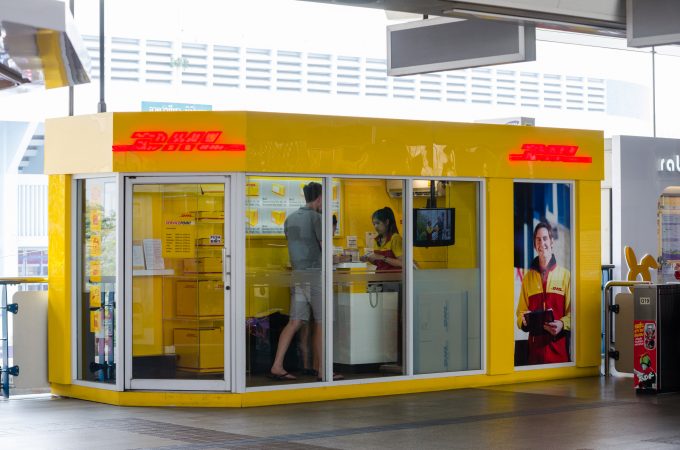Last-mile parcel carriers struggle while global express market is set for growth
The global express parcel market is set to see steady growth over the next four ...
TFII: SOLID AS USUALMAERSK: WEAKENINGF: FALLING OFF A CLIFFAAPL: 'BOTTLENECK IN MAINLAND CHINA'AAPL: CHINA TRENDSDHL: GROWTH CAPEXR: ANOTHER SOLID DELIVERYMFT: HERE COMES THE FALLDSV: LOOK AT SCHENKER PERFORMANCEUPS: A WAVE OF DOWNGRADES DSV: BARGAIN BINKNX: EARNINGS OUTODFL: RISING AND FALLING AND THEN RISING
TFII: SOLID AS USUALMAERSK: WEAKENINGF: FALLING OFF A CLIFFAAPL: 'BOTTLENECK IN MAINLAND CHINA'AAPL: CHINA TRENDSDHL: GROWTH CAPEXR: ANOTHER SOLID DELIVERYMFT: HERE COMES THE FALLDSV: LOOK AT SCHENKER PERFORMANCEUPS: A WAVE OF DOWNGRADES DSV: BARGAIN BINKNX: EARNINGS OUTODFL: RISING AND FALLING AND THEN RISING

DHL is ramping up its e-commerce operations in Asia with the launch of a next-day domestic delivery service in Thailand and expanding its partnership with JD.com in China.
Singling out Thailand as a key growth market for e-commerce logistics in South-east Asia, DHL said it would offer online retailers next-day delivery in urban centres, an e-commerce portal for shipment preparation and full tracking visibility for consumers.
DHL eCommerce chief executive Thomas Kipp said: “Thailand, with its tremendous growth potential, fast e-commerce adoption and high smartphone penetration rates, has been identified as the first south-east Asian country to launch our domestic delivery service in line with our group’s Strategy 2020.”
Thailand’s e-commerce market value grew by 3.7% to $57bn last year, and business-to-consumer sales increased by 15.3%, according to the Electronic Transactions Development Agency (ETDA). DHL says the market could more than triple in size between now and 2020.
Malcolm Monteiro, Asia Pacific chief executive for DHL eCommerce, noted that although Thailand had been quick to adopt online selling, further market growth was likely, since the online share of the retail market was still relatively low compared with other regional economies – “only 1.7% of total sales in Thailand are obtained from e-commerce, compared with more than 10% in China”.
Thailand’s rapid online growth is providing strategic opportunities for new e-commerce logistics services, especially for 3PLs which can provide timely, efficient and traceable last-mile delivery solutions.
To this end, DHL will develop its existing delivery infrastructure with a 3,000sq metre central distribution centre in Bangkok and a national network of 20 depots. A fleet of two- and four-wheel vehicles will provide next-day delivery to all urban areas, with drivers handling cash payments – an important service in a region where credit card use remains comparatively low.
DHL’s strategy in Thailand is to provide a tailored delivery service to SMEs that may lack the capacity to operate their own. In China, however, DHL is expanding its logistics partnership with JD.com, China’s largest online direct sales company.
The two have signed an agreement to co-operate on a range of cross-border supply chain initiatives by making DHL the preferred logistics supplier to JD.com’s International Business Group, which focuses on consumers outside China. DHL will also serve JD.com’s domestic market by handling cross-border imports and distribution.
Upgrading logistics infrastructure and distribution networks is increasingly at the heart of the battle between China’s rival e-commerce giants and between the 3PLs vying for large-scale fulfilment and delivery contracts.
Alibaba has poured billions into its logistics networks, most notably by partnering with Singapore Post (SingPost) to serve South-east Asia, and through its subsidiary Best Logistics, which caters to the vast Chinese express delivery market. In terms of 3PL activity, Damco recently announced an e-commerce logistics fulfilment services for international retailers serving Chinese consumers.
Meanwhile, Amazon’s decision to delve further into China’s logistics market will cause concern among some forwarders.
Amazon has registered its subsidiary, Beijing Century Joyo Courier Service, as a freight forwarder, allowing it to handle exports to the US and Europe. The move could see Amazon take complete ownership of its ocean freight operations, as well as offering logistics services to its third-party merchants.
“We may get cut out,” Cliff Sullivan, chairman of the Hong Kong Association of Freight Forwarding and Logistics, told Reuters.
Comment on this article